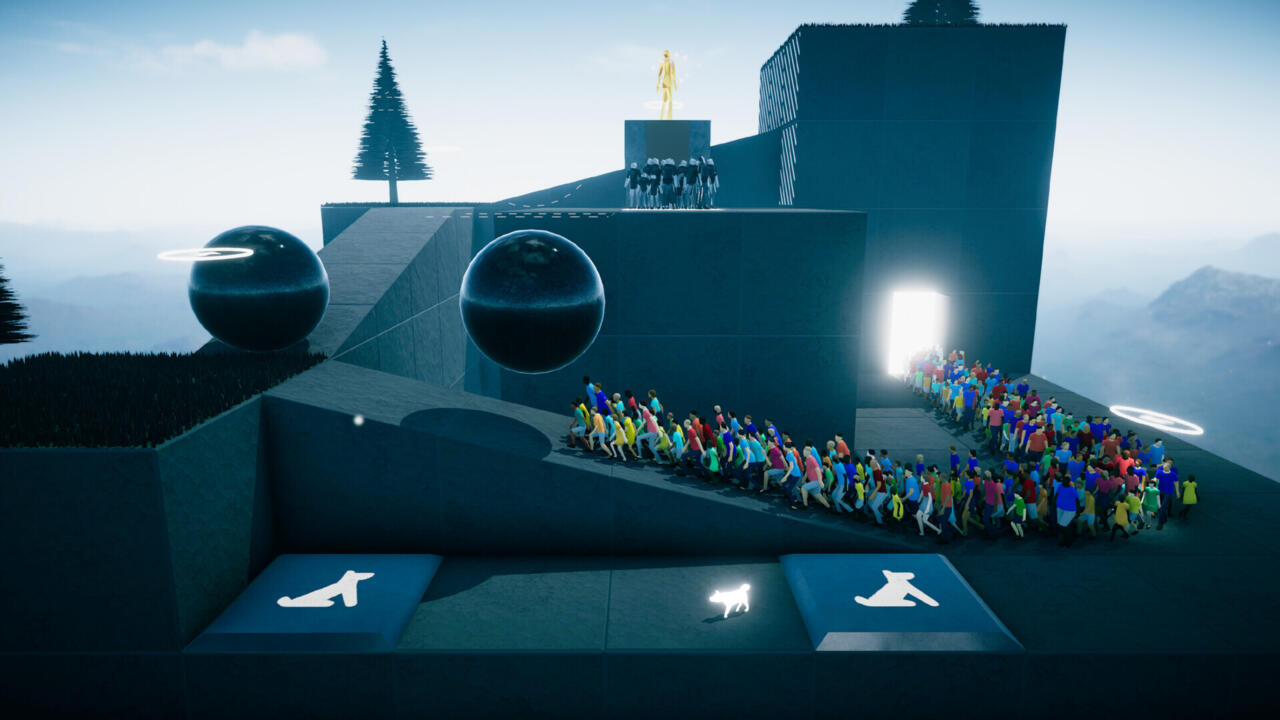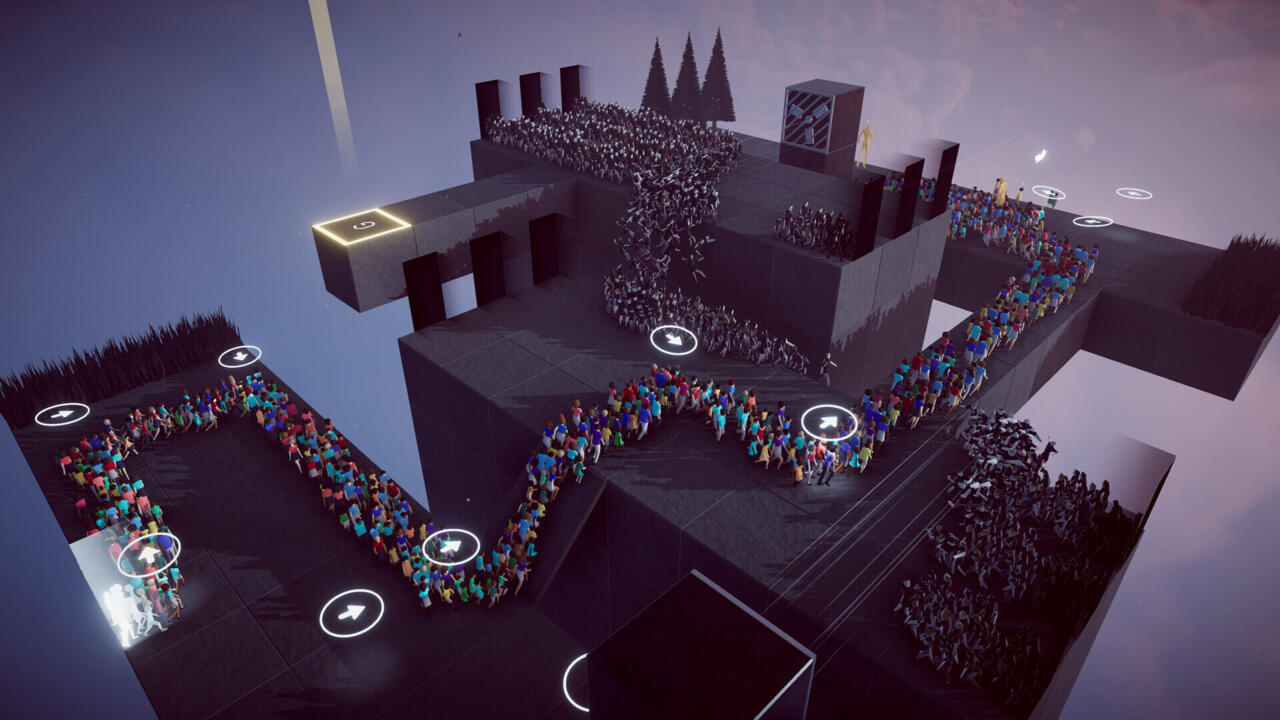Some days you wake up, put on your clothes, and head to work or school. Some days you sleep in and enjoy a hard-earned day off. And some days your consciousness emerges from slumber in the form of a tiny ethereal Shiba Inu, and mysterious glowing orbs instruct you to guide a seemingly unending stream of human souls through winding geometric constructs to a radiant square of light. You know, normal things.
This is the premise of Humanity, a new spatial puzzle game from developer Tha and publisher Enhance Games. Players familiar with the Enhance Games library of titles like Rez and Tetris Effect likely have some idea of what to expect: an artsy experience with chill vibes, minimalistic yet striking visuals, intuitive gameplay, experimental music, and an undercurrent of positivity and warmth. Humanity ticks all of those boxes off easily, while also establishing itself as a unique and charming puzzle game that both calls back to old favorites and adds interesting new innovations.
As the nameless meme-dog, you are tasked with guiding the stream of humans that emerges from a mysterious portal “into the light”–a specially marked square on the field. To accomplish this, you place directional commands on spaces where the flow of humans are walking. If they need to turn left to avoid careening into a pit, you bark and leave a marker to tell them to turn left. Simple! It’s a little bit of Lemmings, but perhaps more akin to Dreamcast sleeper classic Chu Chu Rocket.
But then things get more complicated. Stages (known in-game as “trials”) are broken up into sets of “Sequences,” built around new abilities and gameplay elements. The levels become tall, towering structures where height and depth are prominent factors. Gimmicks appear, such as fans, conveyor belts, and switches that require a flow of human traffic to activate, forcing you to learn how to effectively herd the masses. Suddenly, you have the power to make the humans jump over obstacles, to float in the air, or break into separate groups. You learn the things humans can do inherently without your guidance: Climbing. Swimming. Grouping together to push heavy but movable objects. A rival faction, known only as the “Others,” appears. Weapons appear. And yet, throughout it all, you struggle, you persevere, and you guide humanity to the light for an unknown yet seemingly noble purpose.
Many stages contain a giant, golden human avatar called Goldy, who represents the wishes, dreams, and desires of the populace. Goldy must be touched by and assimilated into the flow of humanity as well, and guided to the exit. Yes, you can usually finish the trial without all of the Goldys, but not always. And you will need a certain number of Goldys not just to get a bunch of neat new options and cosmetic unlocks, but to open the final trial of each sequence. For what is humanity without its dreams and desires? Just an endless, mindless march.
It all starts simply enough, though. The way Humanity gradually builds, easing you into new mechanics and gameplay concepts, is immensely satisfying: Your reward for overcoming a difficult trial is something new and exciting to experiment with and challenge. Controls are simple and intuitive, and the basic visuals make it easy to understand what’s going on at a glance–a blessing when thousands of humans are flooding out into the level. Humanity is an easy game for anyone to pick up and play, and that’s great.

The visual and control simplicity does cause some problems at times, however. In particular, the platforming elements can be a little bit fiddly. It’s especially hard sometimes to tell at what depth and position your dog-avatar is at, leading to many instances where you find yourself careening off a cliff. (You can’t actually die, but it can still be an annoyance at times when you need to move and react quickly.) Surmising what platforms you can and can’t scale without a bit of help can be a bit tricky, too. If you’re lucky enough to be playing the game in stereoscopic 3D with VR, however, I’m sure this is much less of an issue.
Physics also plays a part in several of Humanity’s puzzles: Jumping, floating, pushing, and group movement are among the mechanics you’re taught from a very early stage in the game. They can feel awkward to work with at first, but I eventually got a grasp on how they functioned through a lot of trial and error. Sometimes, however, unpredictable things happen. Large crowds can sometimes push a few stragglers out of the boundaries you’ve set,causing a host of unexpected problems as they hit hazards, move objects, and trigger switches you didn’t intend them to. This tends to happen more often when using the fast-forward feature–which you’ll use a lot. It’s frustrating to have to restart a stage because a few stray humans were pushed out of their “herd” and caused problems.
As part of Humanity’s accessibility features, every puzzle includes an optional video showing a correct solution (though not always how to obtain the Goldys). As someone who does not consider themselves particularly good at spatial puzzles, I am not ashamed to admit making use of this feature at times when I felt completely, hopelessly stumped. But it’s an inelegant and somewhat overbearing way of helping folks. A hint system would have been a welcome addition; I often felt like sometimes, all I needed was a little nudge in the right direction rather than having the whole solution spelled out for me.

You can just look up what you need in the video, but navigating playback using only the PlayStation controller is… not great. Some sort of rewind feature would also be nice for those times when you mistakenly lay down the wrong command or screw up a directional input and mess up minutes’ worth of setup. The need for multiple trial-and-error restarts can be aggravating.
Taken as a whole, however, Humanity is a charming, engaging, and inviting puzzle adventure of a breed that seems all too rare nowadays. Its constantly-evolving gameplay, unique premise, and striking audiovisual landscape make for a game that’s easy to get sucked into for long periods of time. Even better, when you finish the main game, you can dive into the various user-created levels folks all over the globe are already crafting–or try your own hand at creation. Creation is something humanity excels at, after all.

